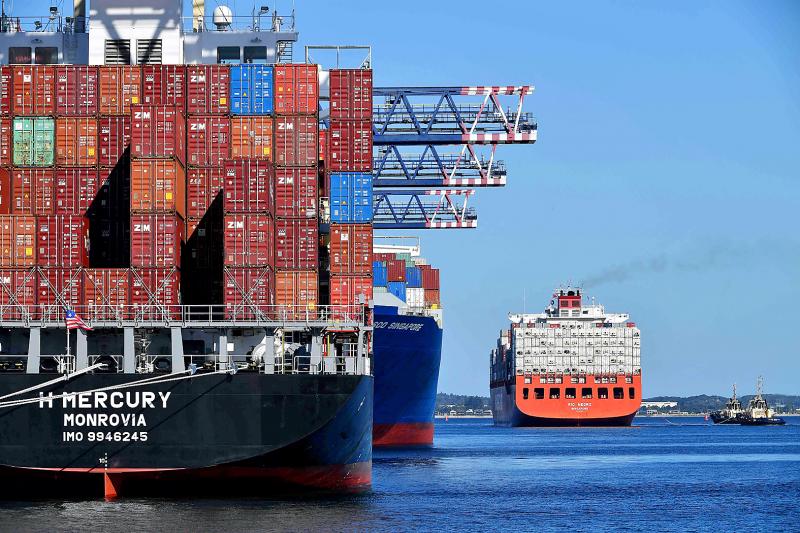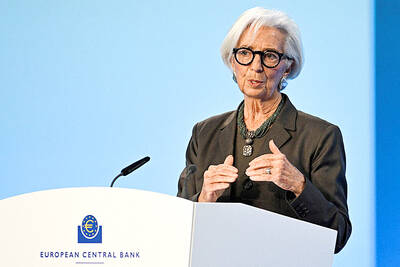Over the past two years, a series of unexpected events has scrambled global supply chains. COVID-19, the war in Ukraine, Brexit and a container ship wedged in the Suez Canal have combined to delay deliveries of everything from bicycles to pet food.
In response, a growing group of start-ups and established logistics firms has created a multibillion-dollar industry applying the latest technology to help businesses minimize the disruption.
Interos Inc, Fero Labs, KlearNow Corp and others are using artificial intelligence and other cutting-edge tools so that manufacturers and their customers can react more swiftly to supplier snarl-ups, monitor raw material availability and get through the bureaucratic thicket of cross-border trade.

Photo: AFP
The market for new technology services focused on supply chains could be worth more than US$20 billion a year in the next five years, analysts said.
By 2025, more than 80 percent of new supply chain applications would use artificial intelligence and data science in some way, tech research firm Gartner Inc said.
“The world’s gotten too complex to try to manage some of these things on spreadsheets,” Gartner analyst Dwight Klappich said.
Interos, valued at more than US$1 billion in its latest funding round, is one of the most successful in the nascent market.
The Arlington, Virginia-based company says it has mapped out 400 million businesses globally and uses machine learning to monitor them on behalf of corporate customers, alerting them immediately when fire, flood, hacking or any other event causes a potential disruption.
Before Russian tanks rolled into Ukraine in February, the company had assessed the effects of an invasion.
Interos said it identified about 500 US firms with direct supplier relations with companies in Ukraine.
Further down the chain, Interos found 20,000 US firms had links to second-tier suppliers in Ukraine and 100,000 US firms had links to third-tier suppliers.
Interos chief executive officer Jennifer Bisceglie said that after the war started, 700 companies approached the firm for help in assessing their exposure to suppliers in Ukraine and Russia.
The company is developing a new product to play out other hypothetical supply chain disruption scenarios, such as China invading Taiwan, for customers to understand their exposure to risk and where to find alternative suppliers, she said.
Supply chain shocks are inevitable, Bisceglie said.
“But I think we’re going to get better at minimizing these disruptions,” she added.
The US’ Delta Air Lines Inc, which spends more than US$7 billion a year on catering, uniforms and other goods, on top of its plane and fuel budget, is one company using Interos to keep track of its 600 primary suppliers and 8,000 total suppliers.
“We’re not expecting to avoid the next crisis, but we’re expecting to be a lot more efficient and effective than our competitors in how we assess risk when that happens,” said Heather Ostis, vice president, head of global supply chain management at Delta.
Santa Clara, California-based KlearNow sells a platform that automates cumbersome paper-dominated customs clearance processes.
That has been a lifesaver for EED Foods, based in Doncaster, England, which imports Czech and Slovak sweets and smoked meats for expat customers in Britain.
“Before Brexit we were very scared we would have to shut down, but instead we are busy as never before,” EED purchasing manager Elena Ostrerova said.
Ostrerova said her company is still growing at annual rate of 40 percent after Brexit took effect in early 2020, partly because some competitors gave up rather than tackle the onerous new paperwork for importing from the EU.
KlearNow’s customs clearance platform keeps track of its hundreds of shipments from Central Europe, tallying totals on thousands of items, correcting mistakes on everything from country of origin to gross net weight, and providing an entry number — under which all the information about a shipment is contained — for the company hauling it to Britain, she said.
“We have minimum human involvement,” which saves the company time and the cost of manual data input, Ostrerova said.
Berk Birand, chief executive officer of New York-based Fero Labs, said the COVID-19 pandemic highlighted the need for manufacturers to adapt to changing suppliers so that they can continue to make identical products, no matter the origin of the raw materials.
The start-up’s platform uses machine learning to monitor and adapt to how raw materials from different suppliers affect product quality, from varying impurities in steel to the level of viscosity in a surfactant, a key ingredient in shampoo. The system then communicates with plant engineers to tweak manufacturing processes so that product consistency is maintained.
Dave DeWalt, founder of venture capital firm NightDragon, which led Interos’ US$100 million Series C funding round last year, said that regulators are going to take much greater interest in supply chain risk.
“If you have a supply chain issue that could cost you major shareholder value, you’ll have a major responsibility, too,” DeWalt said. “I believe that’s coming in the near future.”
Major logistics firms are also deploying machine learning to boost their competitiveness. US truck fleet operator Ryder System Inc uses the real-time data from its fleet, and those of its customers and partners, to create algorithms for predicting traffic patterns, truck availability and pricing.
Silicon Valley venture capital firm Autotech Ventures has invested in KlearNow and newtrul, which aggregates data from transport management systems in the US’ highly fragmented trucking sector to predict pricing changes.
“Mapping your supply chain and interconnectivity at the individual part level is the Holy Grail,” Autotech partner Burak Cendek said.

European Central Bank (ECB) President Christine Lagarde is expected to step down from her role before her eight-year term ends in October next year, the Financial Times reported. Lagarde wants to leave before the French presidential election in April next year, which would allow French President Emmanuel Macron and German Chancellor Friedrich Merz to find her replacement together, the report said, citing an unidentified person familiar with her thoughts on the matter. It is not clear yet when she might exit, the report said. “President Lagarde is totally focused on her mission and has not taken any decision regarding the end of

French President Emmanuel Macron told a global artificial intelligence (AI) summit in India yesterday he was determined to ensure safe oversight of the fast-evolving technology. The EU has led the way for global regulation with its Artificial Intelligence Act, which was adopted in 2024 and is coming into force in phases. “We are determined to continue to shape the rules of the game... with our allies such as India,” Macron said in New Delhi. “Europe is not blindly focused on regulation — Europe is a space for innovation and investment, but it is a safe space.” The AI Impact Summit is the fourth

CONFUSION: Taiwan, Japan and other big exporters are cautiously monitoring the situation, while analysts said more Trump responses ate likely after his loss in court US trading partners in Asia started weighing fresh uncertainties yesterday after President Donald Trump vowed to impose a new tariff on imports, hours after the Supreme Court struck down many of the sweeping levies he used to launch a global trade war. The court’s ruling invalidated a number of tariffs that the Trump administration had imposed on Asian export powerhouses from China and South Korea to Japan and Taiwan, the world’s largest chip maker and a key player in tech supply chains. Within hours, Trump said he would impose a new 10 percent duty on US imports from all countries starting on

STRATEGIC ALLIANCE: The initiative is aimed at protecting semiconductor supply chain resilience to reduce dependence on China-dominated manufacturing hubs India yesterday joined a US-led initiative to strengthen technology cooperation among strategic allies in a move that underscores the nations’ warming ties after a brief strain over New Delhi’s unabated purchase of discounted Russian oil. The decision aligns India closely with Washington’s efforts to build secure supply chains for semiconductors, advanced manufacturing and critical technologies at a time when geopolitical competition with China is intensifying. It also signals a reset in relations following friction over energy trade and tariffs. Nations that have joined the Pax Silica framework include Japan, South Korea, the UK and Israel. “Pax Silica will be a group of nations